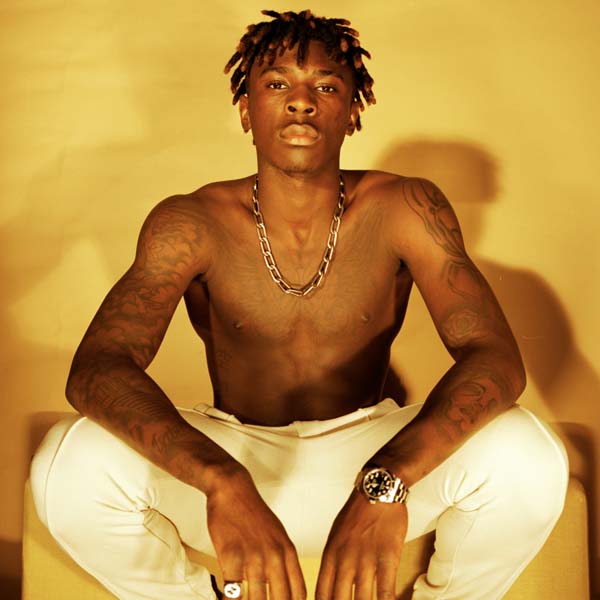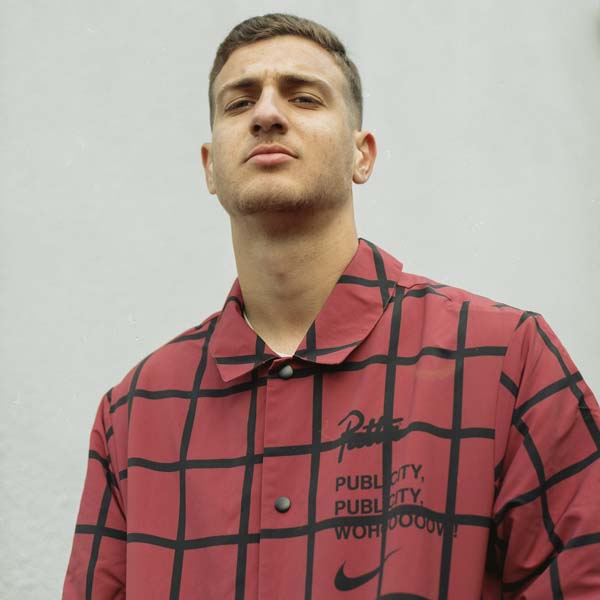New York. Paris. Glasgow. Even among the often zig-zagging flight paths of footballers’ careers, Tim Weah’s route to the top stands out as an interesting one. Speak to him though, as we did for SoccerBible Magazine Issue 12, and any uncertainty about the American’s direction of travel immediately fades away.
At 19 years old, Celtic’s new Bhoy has the focus, the hunger, and the decisiveness of character that mark out not just the future stars of football, but future stars full stop. You've got to have some character to be defined as a footballer, rather than the son of the Ballon d'Or winner and President of Liberia. Still, the thought of the President of Liberia in the away end at St Mirren is one that we couldn't get out of our heads when we caught up with Weah Jr in Glasgow for our 'Coming Thru' edition of SoccerBible Magazine.
Tim, let’s start at the beginning. How did you first get into football?
I basically grew up in a football household. That’s all I knew. From when I was born, that’s the first thing I started doing was kicking a soccer ball. It’s been love since then. I can’t see myself doing anything else besides being a footballer.
What kind of football fan were you growing up? Did you have the kits?
To be honest, I wasn't really that obsessed. I love the sport, I love the game, but I only really love it when I’m playing. I don’t watch it as much. I used to support Arsenal a lot because of my mom. And I’m a huge fan of Arsene Wenger. So Arsenal used to be my team, I used to get all their jerseys. I remember one year they had this yellow and blue kit, and that was one of the first jerseys I actually bought for myself.
That would have been in the Nike days. Are they a brand you’ve always had a connection with?
Yeah for sure. I’ve been wearing Nike my whole life. Besides the fact that I’m signed to them, I’ve been wearing it my whole life, since I was a child. Whenever my mom would ask me what I wanted, it would always be Nike shoes, Nike stuff. I just see the top of the top wearing Nike. As a kid you see LeBron, you see Ronaldinho, Neymar, all those guys, and you’re like, damn, I want to be like them, so I’ve always been a Nike guy.
Who were the players that you were particularly inspired by?
It was probably Ronaldo and LeBron, because they were coming out with their signature shoes, and I always wanted to have my own signature shoe when I was younger. So obviously Nike was the go-to for me. And now that I’m signed with them, my goal is to eventually be able to create a signature shoe.
Is there something in your mindset that makes you want to express yourself in ways beyond football? Like the design process of a shoe?
For sure. I honestly want to design my own shoe. Because it’s a completely different platform to show what you’re about. Where I come from, New York, it’s like a melting pot of different stuff, so I can show people all of that. And just to see people enjoying what you’ve made is the good feel about it. So yeah, just being creative and having that creative mind, showing people I’m not just a footballer, I can do other things.
Do you have an idea of what it would look like?
Yeah, I kind of have everything planned out in my head, like how I want to do it. Become a world-class footballer, and once you do that, so many doors open, you start meeting designers, you get into that world.
Can you tell us a bit about your personal football journey? Coming from the States to Paris is quite an unusual move.
I started playing in this league stateside for a small team called Rosedale. Then I went through Gottschee – a club in New York – and eventually on to Red Bulls. That’s when other people started to see me and I started playing in tournaments. It got to the point where I needed to sign homegrown [forms] for Red Bulls, and my mom was like, “No, you’re not going to sign – I’m going to get you to Europe”. And being that my father played with some teams, he had a connection at Chelsea, so she asked him, “Can you please send him on a trial there?” I went to Chelsea, everything went well, I scored a hat-trick first game, but my mom didn’t really like it that much, so she was like, “No, we’ll wait, we’ll go to other teams, see how it feels”. So I went over to Toulouse.
After the trial I went to a tournament with them and we played against PSG, and that’s when PSG saw me. They were like, okay, it’s George Weah’s son, but he’s also a good player, so let’s bring him in for a trial. So I went to PSG, first game I scored another hat-trick, and that’s when I signed with them.

You mention PSG saying you’re George Weah’s son. Does that tag make you want to prove yourself? That you’re not just George Weah’s son, you’re Tim Weah...
Yeah, because with me being his son, everyone thinks that I have it easy. But it’s actually harder, because you have to live up to the name. You have to be on your A-game, 100 percent, every single day. That’s what people don’t understand. I could have said to hell with football, I could have been doing something else – I could have been living off my parents. But that’s not what I want to do. I want to be my own man, I want to make my own money. I want to be a legend one day. I want to be able to say: “I did it. Through all the trials and tribulations – I made it.”
Do you think your parents’ backgrounds have given you a different perspective on life?
Yeah, my dad being from Liberia, possibly a third-world country, and my mom from Jamaica, another poor country, they didn’t grow up with money, they didn’t grow up with food all the time. So just hearing their stories and growing up under them, they taught me that whatever you want in life you have to fight for it. Because we didn’t have it easy: their philosophy in the house was we’re not going to give it to you easy, even though we have it. You’re going to work for it and you’re going to earn it. That’s basically the mentality that I have to this day: I have to work, I have to work, I have to work. And if I don’t achieve, keep working, keep working, and it’ll happen. I think that’s what moulded me into the person I am today, the fighter that I am.
Just how much work goes into coming through and being able to play professionally?
It’s 99 percent work and one percent chance. I just feel like I’m blessed with a lot of opportunities. I’ve been playing for a long time, so the talent’s there, but once you have talent and you don’t work, a lot of players just give up. Hard work is everything. Even though they’re the same age as me, I look up to Sancho, Ryan Sessegnon, these are guys that are my friends and that I associate with, but I look up to them, because we’re 18-year-olds trying to make it for ourselves in a man’s world and playing a man’s game. We’re not complaining, we’re not saying we’re too young. Age is just a number, and that’s why I look up to Kylian a lot because he’s 19 and he’s literally taken over Europe. It’s amazing to see that.
Those players that you mentioned, each one has their own journey. Take Sancho, leaving a club like Man City, going to Germany. Have you had to go out of your comfort zone to get where you are?
Yeah. I had to make a lot of sacrifices. When I first moved to France, I didn’t speak the language, I didn’t know anyone. I wasn’t with my parents, I was by myself with my brother, and I was like “What am I doing here?” But in the long run it all pays off. As a footballer you have to make sacrifices and you have to make the right choices. In regards to Jadon, I think he made the right choice moving from Man City to Dortmund. At the end of the day, it’s done it for him, and he’s probably one of the best young players in the world.
You’re part of this new generation that mixes football, music and fashion. Do you see that with other players that are out there?
Yeah, if you look at Instagram, for example, you see a lot of young players now, their Instagrams are flashy. Like Jadon, Leon Bailey, all these guys are getting into the fashion, music culture. I think it’s because of basketball. Basketball players paved the way for all of that, because we see how they dress, we see how they lead, and we just try to add our own style. It’s going well, and I think in the future football’s going to be a huge part of fashion. As you can see, PSG is doing that now with all the collabs. It’s getting there.
What are the major trends that you’ve seen in your generation, on and off the pitch? Is there a difference in the way they carry themselves?
We just have the I-don't-care attitude; we’re just living and enjoying our life. In previous generations everyone was kind of the same, no one was doing their own thing. Now I feel like everyone’s doing their thing, everyone has their own two cents on the game and their own styles.
What about music? Who are your go-to artists?
I don’t really have a go-to. I listen to a bit of everything. I try to mix in grime, hip-hop, R&B, African music. I try to mix everything together, keep an open mind.
When you’ve gone from the different countries that you’ve played in, have you found yourself being a sponge for the different sounds you’ve been exposed to? PSG to Celtic, for example, must be quite different.
Ah, Celtic. Man. [Laughs] The only songs that I really don’t like, the only music that I don’t listen to is house and dance. I hate it, and that’s all they play in the locker room, and it’s like... it’s hard. I like Spanish music. I think reggaeton and all that stuff is huge now. But house music is dead. Everything else but that.

You can read the full interview with Tim Weah in SoccerBible Magazine Issue 12, which you can get here.
Photography by Donna McGowan for SoccerBible.















